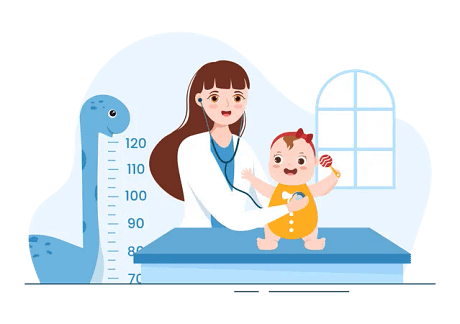
What to Expect During Your Baby’s First Well-Child Visit (<7 Days Old)
The first well-child visit, usually scheduled within the first week after birth, is a critical moment for parents and their newborns. This check-up helps assess your baby’s early development and health while providing parents with valuable guidance on caring for their infant. Here’s a detailed breakdown of what you can expect during this visit.

25 Key Points to Expect During the First Well-Child Visit
1. Identifying Risk Factors
The healthcare provider will start by reviewing any risk factors related to the baby and the parents. This includes assessing any issues noted at birth or during discharge and identifying any concerns that may need monitoring over time.
2. Measuring Growth: Weight, Length, and Head Circumference
If these measurements weren’t taken at the time of hospital discharge, they will be recorded during the visit. Tracking your baby’s weight, length, and head circumference ensures they are growing as expected.
3. Observing Parent Responsiveness to Infant’s Cues
The doctor will observe how parents respond to their infant’s signals and cues. This helps in understanding the bond between parent and baby and provides an opportunity for guidance on responding to the baby’s needs.
4. Observing Parent-Infant Communication
It’s important for the healthcare provider to observe how parents communicate with and handle the baby. This includes how the baby is held, soothed, and spoken to.
5. Observing Play and Interaction in the Waiting Area
During the visit, the healthcare provider might observe the baby’s interaction with parents in the waiting area. This informal setting offers insights into how parents and babies bond and play together.
6. Reviewing Discharge Summary
The doctor will carefully review the discharge summary from the hospital, paying special attention to any high-risk factors that may need follow-up or monitoring.
7. Reviewing Staff Checklist
Your baby’s visit may include reviewing a checklist prepared by office staff. This ensures that all points of concern are covered, such as feeding patterns, sleep, and general behavior, and helps the doctor focus on specific areas needing attention.
8. Reviewing Neonatal Screen Results
If neonatal screening was performed at birth, the doctor will review the results during the visit. If these tests were not done, the healthcare provider may arrange for them to be completed soon.
9. Addressing Parental Health Concerns
The doctor will ask, “Do you have any health concerns about your baby?” This is your chance to share any questions or observations, from feeding issues to sleeping patterns.
10. Discussing Urine and Stool Patterns
You’ll be asked about your baby’s urine and stool patterns, as these are indicators of healthy digestion and hydration. The frequency and consistency of bowel movements provide insight into your baby’s feeding and digestion.
11. Addressing Breastfeeding Concerns
If you have concerns about breastfeeding, the doctor will ask for details on how often and how well the baby is feeding. They will also ask about any breast or nipple pain you might be experiencing and check for problems like poor latch or positioning.
12. Reviewing BCG Vaccine and Vitamin D
The healthcare provider will check if your baby received the BCG vaccine (for tuberculosis) and inquire about vitamin D supplementation, which is important for your baby’s bone health.
13. Assessing Parent Confidence
You’ll be asked about your confidence in handling your baby. It’s normal for new parents to have questions or uncertainties, and the doctor will offer support and advice on best practices for holding, soothing, and interacting with your newborn.
14. Discussing Communication with Baby
The doctor will ask, “How are you both talking with the baby?” Talking to your baby, even at this early age, helps develop their language skills and strengthens your bond.
15. Administering the IAP Parent Stress Questionnaire (IAP-PSQ-4)
At the end of the visit, the healthcare provider may ask you to complete the IAP Parent Stress Questionnaire (IAP-PSQ-4). This questionnaire helps assess the stress levels of parents, providing a window into how well you are coping with the demands of parenthood.
16. Physical Examination
A general physical examination will be conducted, with a focus on assessing jaundice, skin conditions, the umbilical cord, and birth defects. The doctor will carefully check for any signs of yellowing (jaundice) or other skin issues.
17. Systemic Examination
Beyond the physical check-up, the doctor will also examine the major systems of your baby’s body, such as the heart, lungs, and digestive system, to ensure everything is functioning normally.
18. Vision Check
The healthcare provider will look for any ocular abnormalities, such as unusual eye movements or physical concerns with your baby’s eyes.
19. Hearing Test: Order the First Oto-Acoustic Emission (OAE) Test
If the first Oto-Acoustic Emission (OAE 1) test wasn’t done at discharge, the doctor will arrange it now. This test is crucial in detecting hearing problems early, which can affect language and cognitive development.
20. Breastfeeding Pain Check
If you’re experiencing pain during breastfeeding, the doctor will assess the baby’s attachment, suckling, and positioning. They will also check for local breast or nipple problems to ensure breastfeeding is going smoothly.
21. Monitoring for Signs of Neglect or Postpartum Depression
The healthcare provider will be on the lookout for any red flags that might suggest neglect or maternal postpartum depression. This is crucial for ensuring both the baby’s and mother’s well-being during this vulnerable period.
22. Addressing Specific Parental Concerns
The visit is also a time to address any specific worries or questions voiced by parents, whether they relate to sleep, feeding, or general care.
23. Promoting Skin-to-Skin Contact
For low-birth-weight babies, the doctor will emphasize the importance of skin-to-skin contact. This practice helps regulate the baby’s temperature, promotes bonding, and supports breastfeeding.
24. Exclusive Breastfeeding (EBF)
The doctor will provide guidance on the benefits of exclusive breastfeeding (EBF), emphasizing maternal diet, necessary supplements, and the consequences of not exclusively breastfeeding.
25. Using the Maternal and Child Protection (MCP) Card
Finally, the doctor will show parents how to use the Maternal and Child Protection (MCP) card, which tracks vaccinations, growth, and development. They’ll also introduce age-appropriate developmental stimulation activities that parents can engage in with their baby.
The first well-child visit is an important step in ensuring your baby’s healthy start in life. This check-up offers parents the opportunity to ask questions, voice concerns, and gain confidence in caring for their newborn. By focusing on growth, feeding, and developmental milestones, this visit sets the foundation for your baby’s future health and well-being.
Each of these 25 points plays a critical role in providing comprehensive care and ensuring that both the baby and the parents are on the right track. Don’t hesitate to ask questions and engage in this essential process, knowing that your healthcare provider is there to support you every step of the way.










































